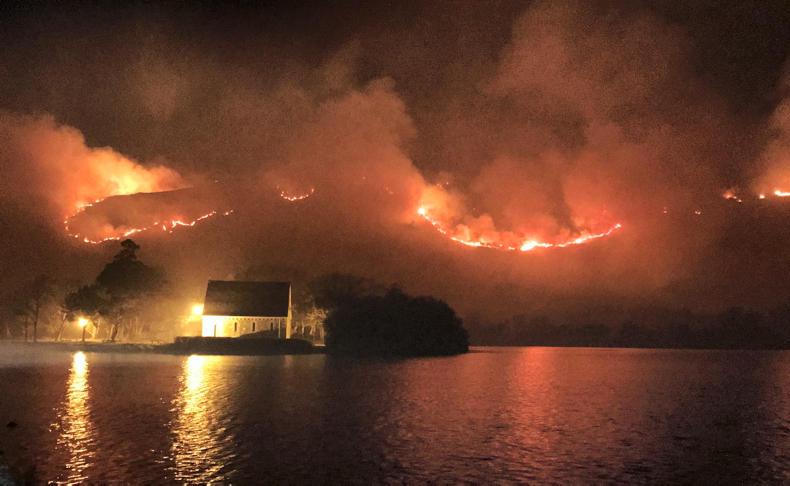A raging wildfire in the picturesque Gougane Barra valley in Co Cork over the weekend brought illegal burning on upland areas sharply into focus.
Thousands of acres of land were burned and there were sheep killed in the fire, Gougane Barra Hotel manager Neil Lucey told the Irish Farmers Journal.
Eight fire brigade units were called to the area, protecting a farmhouse that was threatened by the flames on the shore of Gougane Barra lake.
With all burning illegal between 1 March and 31 August, the fires can destroy livestock, wildlife and commercial forestry.
Some 200ha of forestry have already been lost to forest fires in 2017, according to the Department of Agriculture.
That has serious financial implications, according to Michael Connolly of SWS forestry.
Farm payments stopped
“The landowner loses years of growth; we then have to replant. Forestry premiums stop until replanting and then premiums will only be for the balance of the timeline they are available for.
“These are the financial implications of fires,” Connolly told the Irish Farmers Journal.
“People don’t realise when they are setting fires that these issues are there. The other thing they should realise if they are proved to have set the fires is that any farm payments they get will be stopped,” he warned.
“The forestry service is linking up with the Gardaí. Enforcement is the big issue. I’ve been led to believe that they are going to try to push for prosecutions. If they can get any proof of burning, they are going to push it,” he explained.
“If the Gardaí have enough evidence to pursue people, then the forestry service and the Department of Agriculture will also step in.”
“Until such time as someone gets prosecuted, people will keep burning illegally. The problem is it is very hard to prove in court,” said Connolly. “The majority of cases are burnings that have got out of control. Someone starts a fire, it gets out of control and they just leave.”
The forestry expert added that insurance premiums for forestry are also being affected. “We offer fire insurance, but the premiums have gone through the roof. It’s like flood damage: insurance companies are slower to quote where fires are a regular occurrence,” he said.
“If a place is burned down two or three times, insurance companies are more wary and premiums rise. That’s the problem.”






 This is a subscriber-only article
This is a subscriber-only article












SHARING OPTIONS: